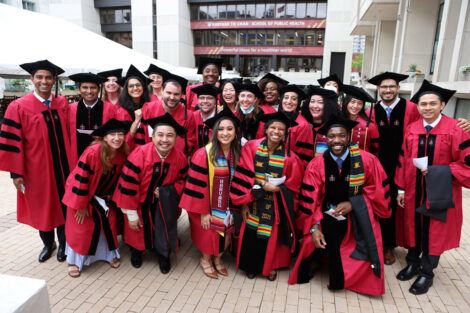May 28, 2022—More than 500 members of the Harvard T.H. Chan School of Public Health classes of 2020 and 2021 returned on May 28 for a special Convocation. For these alumni, it was a long-awaited moment of in-person recognition and celebration after two years of virtual graduations.
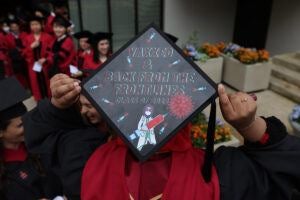
Dean Michelle Williams, who was unable to attend the ceremony due to testing positive for COVID-19, warmly welcomed graduates in a video message. She reflected on the ways that many of them responded to the global pandemic by transitioning “from pupils to practitioners virtually overnight.” Students volunteered with local public health departments, monitored patients in their care, and secured assistance for people in their neighborhoods and around the world. “That’s the spirit we’re celebrating today,” she said.
Other speakers at the ceremony included keynote speaker Jon LaPook, chief medical correspondent for CBS News and Mebane Professor of Gastroenterology at the NYU Grossman School of Medicine; Jane Kim, dean for academic affairs; student speakers Nadhira Nuraini Afifa, MPH ’20, and Russell Simons, MPH ’21; and Trishan Panch, MPH ’10, president of the Harvard Chan School Alumni Association.
Graduates from the two pandemic classes walked across the stage on the Harvard Medical School quad as their names were announced by Amarildo “Lilu” Barbosa, chief diversity, inclusion, and belonging officer. [Read more about the classes of 2020 and 2021 and coverage of their earlier virtual ceremonies.]
This year, a special University-wide Commencement ceremony celebrating the Classes of 2020 and 2021 will be held on May 29. Alumni from 2020 and 2021 also attended the Harvard Chan Live event on May 27, which included networking sessions and panels on public health topics.
‘The next great escape’
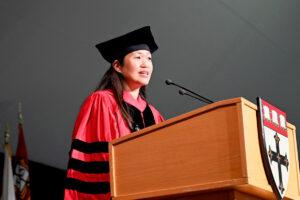
Kim opened her remarks by reflecting on the recent mass shooting at an elementary school in Texas, which came just days after shootings at a grocery store in New York and a church in California. “It’s easy to feel overwhelmed by the multitude and magnitude of the public health challenges we face, including the pandemic and gun violence,” she said. “But there’s a reason to be optimistic, and days like this remind us why.”
While the influenza pandemic of 1918 would infect one third of the world’s population and cause life expectancy to plummet, it was followed by a century of human flourishing on a previously unimaginable scale, Kim said. Today, people around the world have been freed from many of the threats that plagued our ancestors and are living healthier, wealthier, longer lives—a phenomenon economist Angus Deaton called the “great escape.”
Public health fueled this change is countless ways, from vaccine development to improved sanitation, Kim noted. But with many daunting threats still facing the world today, she asked, “Have we reached the end of this incredible run of human flourishing—or are we just getting started?”
She told the School’s pandemic graduates that they made her feel optimistic about the future. “Everything you’ve learned during your time here has made you capable public health stewards—but going through this crisis will make you exceptional ones,” she said. “And because of it, you are the ones who will drive our next century of progress, our next great escape.”
‘Leaping higher’
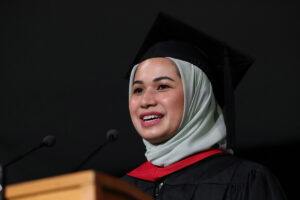
Afifa, who came to Harvard Chan School from a small town in Indonesia, said that it felt surreal to be back at the School that played an important role in her public health career. She is a physician and public health consultant whose work has included tackling childhood malnutrition and assisting the Indonesian government with its COVID-19 response.
When she first arrived in the U.S. for orientation, Afifa was afraid that her hijab would mark her as different and as a target for Islamophobia. But in her second week at the School, her perception started to change. After she learned that there was a praying room equipped with everything she needed, she began to feel more confident. “Equality, inclusivity, unity—I cannot think of any better place to learn those concepts but here,” she said.
“From the beginning of my journey as a public health professional, I promised myself that I would always apply my knowledge to contribute to society,” said Afifa. “And I encourage you all to promise that we will not stop ourselves from leaping higher and making an impact on the world through public health.”
Changing what can’t be accepted
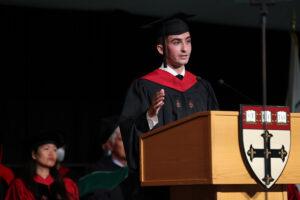
Simons, who earned his medical degree the previous day from the University of Chicago, studied health policy at Harvard Chan School and said he came away with an appreciation for the ways that public health and medicine intersect with politics.
He recalled feeling powerless to meet the needs of the socioeconomically disadvantaged patients he cared for as a medical student. He said that “the medical textbooks I was studying didn’t talk much about politics, poverty, or structural racism. And yet I kept asking myself, if these are the things that are making my patients sick, aren’t they my responsibility to address too?”
Simons cited the work of Jack Geiger, SM ’60, who was able to pursue social change in Mississippi in the late 1960s under the umbrella of a community health clinic. Looking to this model, Simons said that he no longer finds comfort in the Serenity Prayer, which calls for the courage to accept things that can’t be changed. He said he now prefers the revision by academic and activist Angela Davis: “I’m no longer accepting the things I cannot change. I’m changing the things I cannot accept.”
‘Empathy is your superpower’
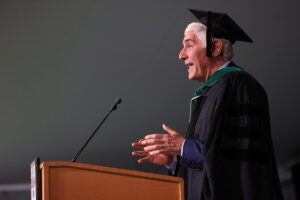
Physician and broadcast journalist LaPook said that he’s come to realize that “no credential, in any field, is as crucial to success as the ability to experience and practice empathy.”
In 2014, he founded The Empathy Project, which teaches clinicians to be more effective by practicing empathy. He said that the project defines empathy as “the practice of authentically trying to understand another person’s lived experience through communication and, more specifically, through engaged curiosity.” It can establish trust and minimize bias, he said, adding that patients have better outcomes when they experience their caregivers as empathetic.
He described the “master class” in empathy he received from the late Paul Farmer, Kolokotrones University Professor at Harvard and a giant in the field of public health. LaPook met Farmer in Haiti in the aftermath of the deadly 2010 earthquake. While at a hospital reporting for a story, LaPook witnessed the death of a premature baby who would have had an excellent chance of surviving had he received care in the U.S. Farmer was personally offended by this kind of healthcare inequity, LaPook said, adding that “He channeled his world-class empathy and sense of decency into passion and action.”
“Empathy is your superpower,” LaPook said. “There are lots of ways each of you will be able to make a difference, and I believe it will depend in large part on how well you are able to nurture your empathy.”
LaPook noted that Farmer knew that having empathy can make a person vulnerable—a lesson he wished he’d learned as an intern in New York in 1981. He recalled feeling helpless as his patients died from AIDS, but reflected that he did not fully process the trauma until seeing a play about the crisis years later. Thankfully, LaPook said, the young clinicians he worked with in COVID-19 wards in April 2020 understood that it was okay to shed tears and to seek help for stress and burnout.
“It’s essential to help yourselves if you want to enjoy a long and productive career helping others,” he told the graduates. “Yes, there will be challenges ahead, and some of you will see things that will break your heart, but you’ve chosen a career in which you can love going to work and get real joy from what you do. How great is that?”
Making the impossible inevitable
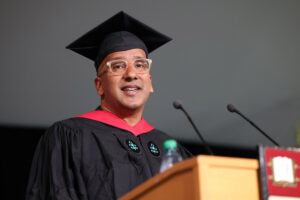
Panch congratulated graduates on their resilience and creativity during the pandemic. Their efforts proved that the most important resource in public health is people, said Panch, co-founder of Wellframe, a digital health company that uses technology to improve chronic disease management. “People who are able to relate scholarship to context, and to relentlessly collaborate and innovate to make the impossible possible and then inevitable.”
He urged graduates to remember that despite their intelligence and training, they remain flawed human beings—and to show themselves compassion during times when they fail. On behalf of the School’s Alumni Association, he said, “we would like to remind you that, as your journey continues to unfold, we are all in this together with you.”
photos:
J.D. Levine
Ben Gebo Photography
Additional coverage
Watch video of Harvard Chan School’s Convocation for the Classes of 2020 and 2021
Photo gallery – Class of 2021 and Class of 2021 (password: 2020-2021)
Watch video of Harvard Chan School’s 2022 graduation
Graduation 2022: The power of global partnerships in public health
Graduation 2022: Award winners
Jesse Bump, Nancy Turnbull receive inaugural Sastry Awards for outstanding teaching
Graduation 2022: A day of reconnecting and learning
Graduation 2022: At Affinity Graduations, students can celebrate ‘in community with others on a shared experience’
